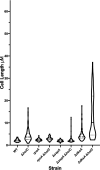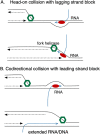The Role of Replication Clamp-Loader Protein HolC of Escherichia coli in Overcoming Replication/Transcription Conflicts
- PMID: 33688004
- PMCID: PMC8092217
- DOI: 10.1128/mBio.00184-21
The Role of Replication Clamp-Loader Protein HolC of Escherichia coli in Overcoming Replication/Transcription Conflicts
Abstract
In Escherichia coli, DNA replication is catalyzed by an assembly of proteins, the DNA polymerase III holoenzyme. This complex includes the polymerase and proofreading subunits, the processivity clamp, and clamp loader complex. The holC gene encodes an accessory protein (known as χ) to the core clamp loader complex and is the only protein of the holoenzyme that binds to single-strand DNA binding protein, SSB. HolC is not essential for viability, although mutants show growth impairment, genetic instability, and sensitivity to DNA damaging agents. In this study, we isolate spontaneous suppressor mutants in a ΔholC strain and identify these by whole-genome sequencing. Some suppressors are alleles of RNA polymerase, suggesting that transcription is problematic for holC mutant strains, or alleles of sspA, encoding stringent starvation protein. Using a conditional holC plasmid, we examine factors affecting transcription elongation and termination for synergistic or suppressive effects on holC mutant phenotypes. Alleles of RpoA (α), RpoB (β), and RpoC (β') RNA polymerase holoenzyme can partially suppress loss of HolC. In contrast, mutations in transcription factors DksA and NusA enhanced the inviability of holC mutants. HolC mutants showed enhanced sensitivity to bicyclomycin, a specific inhibitor of Rho-dependent termination. Bicyclomycin also reverses suppression of holC by rpoA, rpoC, and sspA An inversion of the highly expressed rrnA operon exacerbates the growth defects of holC mutants. We propose that transcription complexes block replication in holC mutants and that Rho-dependent transcriptional termination and DksA function are particularly important to sustain viability and chromosome integrity.IMPORTANCE Transcription elongation complexes present an impediment to DNA replication. We provide evidence that one component of the replication clamp loader complex, HolC, of Escherichia coli is required to overcome these blocks. This genetic study of transcription factor effects on holC growth defects implicates Rho-dependent transcriptional termination and DksA function as critical. It also implicates, for the first time, a role of SspA, stringent starvation protein, in avoidance or tolerance of replication/replication conflicts. We speculate that HolC helps avoid or resolve collisions between replication and transcription complexes, which become toxic in HolC's absence.
Keywords: DNA repair; DNA replication; stringent response; transcription factors.
Copyright © 2021 Cooper et al.
Figures











Comment in
-
DNA polymerase III protein, HolC, helps resolve replication/transcription conflicts.Microb Cell. 2021 May 6;8(6):143-145. doi: 10.15698/mic2021.06.753. Microb Cell. 2021. PMID: 34055967 Free PMC article.
References
Publication types
MeSH terms
Substances
Grants and funding
LinkOut - more resources
Full Text Sources
Other Literature Sources
